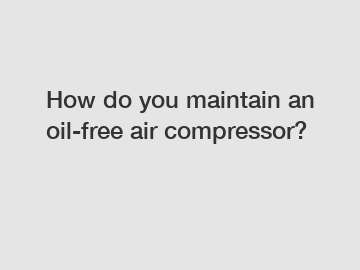How do you maintain an oil-free air compressor?
How do you maintain an oil-free air compressor?
Maintaining an oil-free air compressor is crucial for ensuring its performance and longevity. Oil-free air compressors have gained popularity due to their environmental friendliness, reduced maintenance requirements, and versatility in various applications. However, proper maintenance is still necessary to keep these machines operating at their best. In this article, we will explore the essential steps to maintain an oil-free air compressor effectively.
1. Regular Cleaning and Inspection:

To maintain an oil-free air compressor, it is essential to start with regular cleaning and inspection. Dust, debris, and other contaminants can accumulate in the compressor, leading to reduced airflow and potential damage. Carefully clean the exterior of the machine to remove any dirt or debris. Inspect the intake vents, filters, and cooling fins for clogs, and clean or replace them as needed. Regular cleaning and inspection will prevent blockages and ensure optimal airflow.
2. Proper Lubrication:
Although oil-free air compressors do not require lubrication, there are still components that may need proper lubrication to function smoothly. Check the manufacturer's guidelines to identify any parts that might require periodic lubrication. Typically, these components include bearings, bushings, and slides. Be cautious not to use oil-based lubricants as they can damage the machine. Always follow the manufacturer's recommendations for lubrication to avoid any potential issues.
3. Regular Filter Replacement:
Filters in an oil-free air compressor play a critical role in maintaining the quality of the compressed air. Over time, dust and contaminants build up in the filters, reducing their effectiveness. Regularly replace the intake filters based on the manufacturer's recommendations. This ensures clean, contaminant-free air and prevents damage to the compressor. Neglecting filter replacement could lead to decreased performance and potential damage to internal components.
4. Check for Air Leaks:
Air leaks can significantly impact the efficiency of your oil-free air compressor. Regularly inspect the fittings, connections, hoses, and gaskets for any signs of leakage. Leaks not only waste energy but also cause the compressor to work harder than necessary. Utilize soapy water or an ultrasonic leak detector to identify leaks accurately. If any leaks are detected, promptly repair or replace the affected components to maintain optimal performance.
5. Monitor and Maintain Proper Pressure:
Every air compressor has an optimal operating pressure. It is crucial to monitor and maintain this pressure level consistently. Operating the compressor above or below the recommended pressure range can lead to increased wear on the internal components. Use a pressure gauge to monitor the pressure and adjust it accordingly. Maintaining the proper pressure level helps maximize the compressor's efficiency and prolong its lifespan.
6. Keep the Environment Clean:
The surrounding environment plays a significant role in the maintenance of an oil-free air compressor. Ensure the area where the compressor is located is clean and free from debris. This prevents contaminants from entering the machine and affecting its performance. Additionally, maintain proper ventilation to prevent overheating and ensure efficient operation. A clean and well-ventilated environment creates a conducive atmosphere for the compressor to operate optimally.
7. Schedule Professional Maintenance:
While regular cleaning and inspection are vital, it is also essential to schedule professional maintenance for your oil-free air compressor. Professional technicians have the expertise and tools to thoroughly inspect, clean, and service the compressor. They can identify potential issues early on and prevent major breakdowns. Follow the manufacturer's recommended service schedule and have a professional technician perform routine maintenance at the suggested intervals.
In conclusion, proper maintenance of an oil-free air compressor is essential to ensure its longevity and optimal performance. Regular cleaning, inspection, lubrication (if necessary), and filter replacement are crucial steps to keep the compressor operating efficiently. Monitoring and maintaining proper pressure, checking for air leaks, and maintaining a clean environment further contribute to the compressor's overall health. By following these maintenance practices and scheduling professional maintenance when needed, you can enjoy the benefits of an oil-free air compressor for many years to come.
Contact us to discuss your requirements of Air Compressor Application Field, Air Compressor Industry News, Air Suspension Blowers factory. Our experienced sales team can help you identify the options that best suit your needs.


